Tears For Fears: The SDE Interview
“We’re happy again. So we didn’t make another studio album”
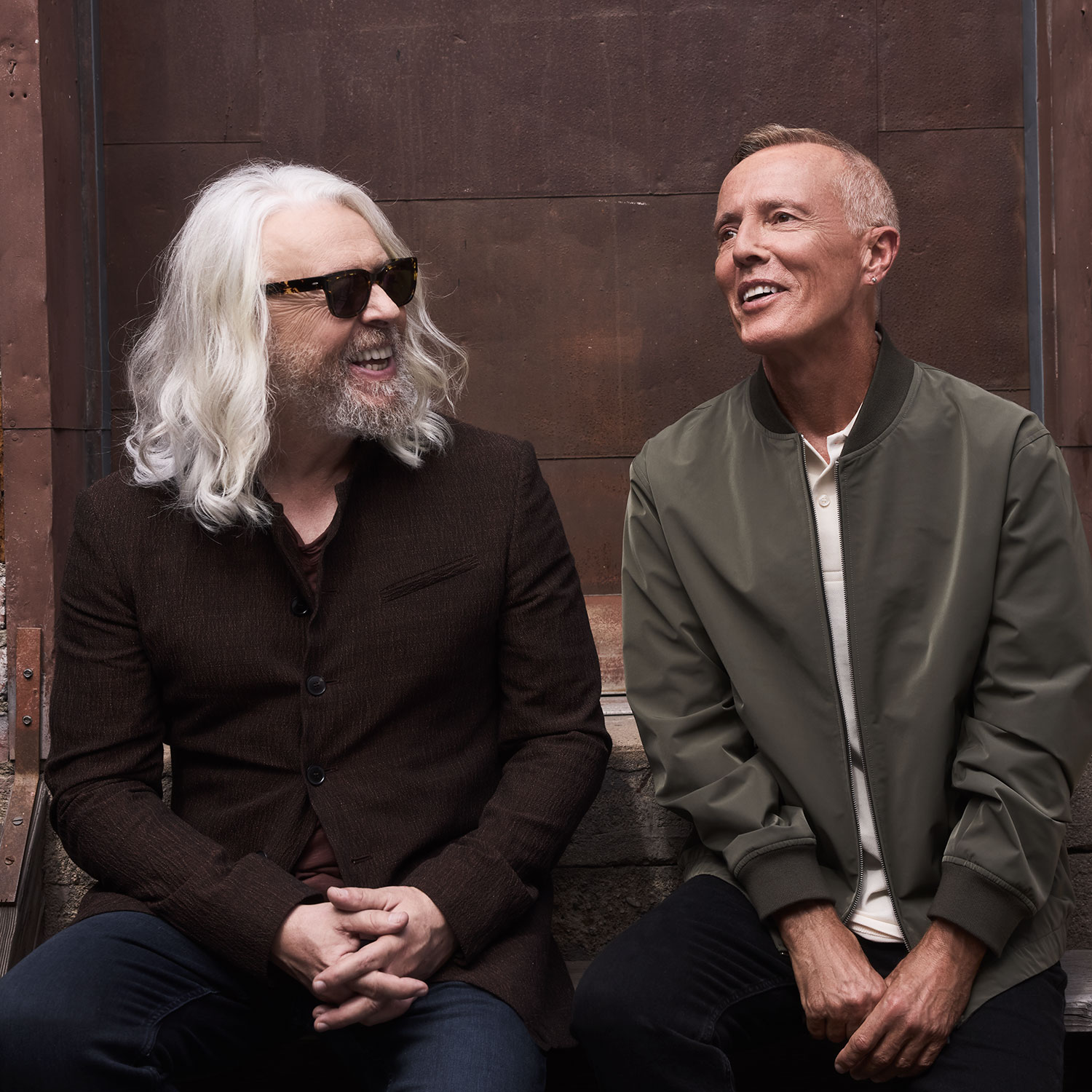
Tears For Fears return with Songs For A Nervous Planet, a brand new ‘hybrid’ album [out tomorrow] with four brand new studio recordings and 18 live tracks from part 2 of the band’s Tipping Point tour in 2023. A companion concert film Tears For Fears Live: A Tipping Point Film is showing at cinemas worldwide tonight and on Saturday (more info here).
Last week SDE caught up with Roland Orzabal and Curt Smith at their record company offices in London to discuss the new songs, the live album, the film and their reissue plans for the future…
SDE: It’s exactly three years since we last spoke, when The Tipping Point was being launched. How pleased are you with how well received that album was?
Curt Smith I think it’s done wonders for us. When we finished the album, we listened to it and thought, “this is great”, but of course, you don’t know how it’s going to be received until it’s received, and for it to be received that well makes you realize that you know your audience. It’s always gratifying when something you think is really good does well.
Were you confident, Roland, that it would get the reaction that it got?
Roland Orzabal : No! [laughs]. I think what it was, was in 2004 we put out Everybody Loves A Happy Ending, and we had a great time recording it, and it was just this fantastic outpouring of creativity and we weren’t encumbered in any way. And [long pause]… it became a series of disasters. You know, LA Reid [President & CEO of Arista Records] being fired just as the album was about to come out on Arista, etc, etc. So when we were making The Tipping Point, even though it still felt good and unencumbered, I wasn’t sure whether it would just disappear into the ether again. Having said that though, the Happy Ending album was very unlike early Tears For Fears. It was almost like a very relaxed follow up to The Seeds of Love. And then with The Tipping Point, I realised that we are good at dealing with the heavy issues, similar to The Hurting which I see as very much having a direct link to The Tipping Point.
You think the lyrical weight to The Tipping Point might have connected with people?
Curt Smith: Yeah, without question. I mean, after everything that had happened just prior to that, I think it did connect with an audience. And I think Roland’s right, when you look at Everybody Loves A Happy Ending, at times, it’s a bit more whimsical, but it sounds like we’re enjoying it and playing around a bit. The story of that album is really just the title [laughs]. It doesn’t really have a theme going through it, particularly, and…
Roland Orzabal …it didn’t go through the mill [laughs]. There’s something about us together and our lives, when it comes to music, that means we have to work harder than possibly most people… and that was certainly true for The Hurting, and it was true for The Tipping Point, which took years to come together.
Now you’re back with this live record. Why have you chosen to do a live album? There was that one before [Secret World] that came out in France…
Curt Smith …Over which we had no control
Okay, so this is the first proper ‘approved’ live album. So why did you decide to do it? Is it just an easy thing to do?
Curt Smith: I think the initial idea was the film, because we felt the band was so good, and visually, this tour, The Tipping Point tour was really good. And the music from the new album, fitted in so well and we really felt that the new music was as strong as our older music. But once we agreed to do the film, people from the record company were asking “what comes next?” and we felt that it was good enough to release a live album. We felt that the band was the best it’s ever been; we were the best, as far as playing and singing was concerned, that we’ve ever been. So we felt it was probably time to do that sort of anthology of where we were at this point in time, in a live album.
Roland Orzabal: Yeah, it was also a question of, how are we going to follow up The Tipping Point? Because it was very well received. It’s almost like that was enough. It’s like “we get Tears for Fears now, we understand them – don’t give us any more music”. We’ll dine out on this for many, many years to come. So then it became pretty obvious from the two of us independently, that we were going to do a live record, and after that it was a question of how we’ve got to sell it. What are we going to do with it? We could have quite easily done another album, but what’s the narrative? Everything is fine, now. Everything is wonderful. We’re happy again. So we didn’t do another studio album. We did four tracks very quickly and put it together, in a sense, to make a hybrid album.
Songs From The Big Chair was cobbled together
Roland Orzabal
With these four tracks you’re almost halfway to studio album, aren’t you? Certainly based on Songs From The Big Chair. But what you’re saying, Roland, is that it just didn’t feel like the right time. Too soon?
Roland Orzabal: This is, again, a good analogy, because you got The Tipping Point and The Hurting and then you’ve got Songs For A Nervous Planet and Songs From The The Big Chair. Songs From The Big Chair was cobbled together. I know it doesn’t sound like it, but it really was. We had a B-side, ‘Broken’, that kind of stuff, plus live material and then there was an instrumental [‘Listen’] that Ian [Stanley] had lying around. It was cobbled together. We could have done exactly the same thing [if we’d wanted to].
It did well for a cobbled together album…
Roland Orzabal: Very well, because of certain songs…
Curt Smith …certain songs, and weirdly, in terms of it being put together like that, tracks like ‘Listen’ are incredibly important for that album. It was cobbled together, but it worked, because we felt we had these three very big hits, and so the rest had to have some depth and be a little stranger. And so ‘Broken’ came in; ‘Listen’, came in. I mean, I think the gel that holds it all together, is actually ‘The Working Hour’. The only one I have an issue with on that album is ‘Mother’s Talk’. The rest I’m happy with. And the reason why – and that tells you the story – is there are so many versions of that song.
I’ve actually heard the unreleased early Jeremy Green version [recorded and rejected before the original album cut]
Roland Orzabal: Oh dear. I kind of hoped that would be buried.
Curt Smith: I still don’t think we ever got it right. But I think with the new four songs on Songs For A Nervous Planet, I think, for us, it’s more a snapshot in time. There was a lot of pain involved in The Tipping Point, and whether it was a conscious decision or not, it seemed important to update where we were emotionally at this point in time. It’s certainly far more optimistic; it’s far happier. So it’s basically saying, you can come out of the end of all of that and be okay. And I don’t think we needed to make a whole album stating that. Making a whole album of happy music… it’s just not us.
To a degree it’s probably self explanatory, but the title ‘Songs For A Nervous Planet’ can you expand a little, on where that came from?
Roland Orzabal: It’s a riff on a book by Matt Haig called Notes On A Nervous Planet. That was a book I was reading in 2018 when I was suffering from a little bit of anxiety, to say the least, and what he’s actually saying in that book, I believe, is that what is making you nervous is how you are receiving the information. So it’s not about an ecological disaster, it’s not about the wars, that are always a feature of the human world. It’s about the fact that most people nowadays get their information from social media. And if you don’t get your information from social media, certainly in the States, you’re looking at a news feed which is divisive, whether it’s Fox or CNN. So the idea, I think, for Songs For A Nervous Planet is just actually trying to get away from the things are, in a sense, making your life more toxic.
Let’s talk about the studio recordings. Were they new or were some of them from The Tipping Point sessions?
Roland Orzabal: We had ‘Astronaut’ around, for almost 10 years. And I would say that, ‘Say Goodbye to Mum and Dad’, that guitar riff – which is buried – and the title, came about while we were making The Tipping Point, and actually while we already had at least 10 songs. So it was never truly a contender [for The Tipping Point album] and it certainly wasn’t developed enough. ‘Emily Said’, was some dumb idea that been around for a while, but the verse is new, the bridge is new, the chorus is new… and A Girl That I Call Home there was a backing track from the days of trying to write for The Tipping Point which had been completely forgotten. I came across the verse while I was emptying out an old computer, and I thought it was kind of interesting.
Have you got any songs leftover from the so-called “speed dating” sessions [where Tears For Fears worked with a procession of other songwriters] that we talked about, before?
Curt Smith: We had a ton of songs…
Are they just never gonna see the light of day?
Roland Orzabal: Well, you never know, because the fact is with The Tipping Point, it was saturated with good songs, songs that became singles on [BBC] Radio 2… We wouldn’t have been able to fit on ‘Astronaut’ or ‘The Girl That I Call Home’.
Curt Smith: The problem with a lot of the things from those speed dating episodes, is that they weren’t really us. But that’s not to say they couldn’t become us. There may be germs of an idea that you then make your own. But the songs that were on The Tipping Point had a story and had a flow to them that anything else would have interrupted.
How do you record together these days, Curt? Do you two feel the need to be in the same room or is that not really relevant anymore, with modern technology?
Curt Smith: For recording it’s definitely better to be together. For the writing proces, it’s not necessary.
Roland Orzabal: Absolutely.
So with these new songs, that was the case? You were in the same room?
Roland Orzabal: I spent the first two months this year in LA [where Curt lives] and yeah, some of the songs obviously are older, like ‘Astronaut’, but it was only when we we got together in the same room, that we finished a song like ‘Emily Said’, which didn’t have the verse or anything like it had in the end.
Was it just the two of you?
Roland Orzabal: We’ve got a guy we work with in the studio, who did the Happy Ending album, and he did The Tipping Point…
You’re referring to Charlton Pettus…
Roland Orzabal: Exactly. He speaks Curt’s language [comedic pause] because he’s American, and he speaks mine as well [laughs]
I was going to ask you about Charlton, actually. It strikes me he’s someone in the lineage of an Ian Stanley or a Chris Hughes?
Roland Orzabal: He’s like the two of them together.
He does everything, doesn’t he? He produces, writes… Is he the musical director, when you’re on tour?
Roland Orzabal: No. I would say, I do that… but having said that, though, in our band live, I’m a musical director, but Charlton is also a musical director, and so is Doug Petty, our keyboard player, so between the three of us it’s like, “shut the fuck up!”
How do you see Tears for Fears as a live unit? How has that developed over the years? I remember, we talked quite a long time ago about the Big Chair tour and working with the limitations of having a Revox tape machine. How different is it these days?
Curt Smith: It’s very different. I mean, we still have a computer playing stuff, to a certain degree, you know. Or you can get to ‘Badman’s Song’ on the live record, and on the film, which is 100 percent live. It’s just a band playing and enjoying themselves. To me, the biggest difference is the level and the standard of people we’re working with. And when they’re that good and that talented and creative, it pushes you. You’ve got to be that good. And I think that’s a really good thing. They bring more to the party than people we worked with before.
Roland, are you enjoying the touring a lot more than you did in the old days?
Roland Orzabal: Far more.
Curt Smith: Without question. And that’s a combination of the people we work with because not only are they really good musicians, they’re easy to be on the road with. They’re older people with kids like us.
Why was it different in the 80s, then? Is that just because everyone’s younger…
Curt Smith: Everyone’s younger and…
Roland Orzabal …It’s egos and immaturity.
Curt Smith: And, you know, once you have kids in your family, it’s weird; you change completely because you have something far more important at home than this. Whereas when you’re younger, this is all of your life. And everything revolves around it.
When you start out, you are very much stuck in with your peers. You know, “they’re a bit like Depeche Mode”…
Roland Orzabal
Roland Orzabal: Also, it’s, quite simply, the amount of songs you have to pick from, which is fantastic nowadays. And you realise that when you start out, you are very much stuck in with your peers. You know, “they’re a bit like this”, “they’re a bit like Depeche Mode…” but the more you carry on, the older you get, the more everyone realises – and even you realise – that actually you’re doing something that no one else does, which is wonderful.
Curt Smith: Also, as you as you get older and keep creating things of quality, you get far more respect. I find interviews far easier to do now than I did then, because no one’s trying to pick us apart; we have a history now. And as far as touring goes, the other thing that makes it far easier is when we were younger and at the height of our fame, the record companies wanted us to do everything, you know, do interviews all day long, play, shake hands and kiss babies after the show and we never saw anything. And now when we go on tour, we’re actually visiting the places we go. I actually leave the hotel and walk out and go see it. If you asked me what I saw on the Songs From The Big Chair tour it would it be nothing. The inside of a hotel is what I saw.
And they were longer slogs in those days.
Roland Orzabal: Yeah, eight months for the Big Chair tour. Just ridiculous. That’s gonna put you off.
Do you get recognised much, in the street, these days?
Curt Smith: More than I have for a long time. When I lived in New York, this is 35 years ago, I didn’t get recognised much, or at least people there just didn’t stop you, but since going back a lot – because my kids are there – I get recognized a few times, every time I’m there with them. Recently I was in Dublin with my brother and I was there for three days, and I got stopped eight times, which never happens. But generally we tend to fly under the radar, which is great. We have quite private lives, and we don’t really enjoy that side of it, so it works for us.
What about you, Roland? You’re rocking a quite different look from the old days. Do people recognize you?
Roland Orzabal: Only when I’ve got my hair down, so I put my hair up!
Curt Smith: We get recognized a lot more if we’re together.
Roland Orzabal: I’ve been with other mature gentlemen, and they thought we were Tears For Fears!
Curt Smith: I had dinner with John Taylor once and they they recognized John but not me [laughs].
Getting back to the live shows, can explain how you can perform a song as complicated as ‘Sowing the Seeds of Love’ live, given it has all these different sections, tempos, whatever. How do you actually go about recreating that live?
Roland Orzabal: The sequencing on that song is more the overdubs, because – and I’ve probably told you this before – when we were recording ‘Sowing the Seeds of Love’, we took the tempo of [The Beatles’] ‘I Am the Walrus’, so live, we have a click track that keeps us in with that rhythm, including the tempo changes. And live the keyboard player is playing the whirly [Wurlitzer organ], Curt’s playing the bass, we’re playing guitars, the drums are real… It’s great. It’s easy.
Is it easy though?
Roland Orzabal: It’s got to be easier than ‘Emily Said’…
Curt Smith:…Oh, that’s fucking weird…
Roland Orzabal: The verse is in B major, and you try playing your arpeggios like that [mimes a difficult looking chord shape], okay? And then the chorus is the same arpeggio in C, which is a lot easier, but that song itself is a bit tough, yeah. And then even the guitar part from ‘Say Goodbye to Mum and Dad’. I’m like, God…
When you’re being filmed on stage, what level of stress does that add to proceedings?
Roland Orzabal: It adds a level of stress, no question.
Curt Smith: Yeah. You look at the film [Tears For Fears Live: A Tipping Point Film], and I know we play shows where we look far more relaxed than that. We don’t look that relaxed, although, I don’t know whether people notice it, probably not. But that stress and that self consciousness made us play well, you know, because we were actually concentrating on it. We record [the audio] every night and the filmed show was one of the best performances.
Roland Orzabal: By the end of the evening, I knew the three guitar / lyric mistakes that I’d made, and I asked Charlton [Pettus], who put it together, to take them from Virginia Beach show, to fix some of the mistakes. And he did some vocal tuning, as well, but that was it.
You’ve got this Vegas residency coming up. It’s only three days not seven months, but where did that idea come from? I’m coming, by the way!
Roland Orzabal: Ah, you’ve just made me extremely nervous [laughs]. Where’d the idea come from? Again, it was management. It was management that suggested we do a live film, it was management that said, ‘let’s just do a Vegas residency’. And I think partly it’s to do with the fact that we’re managed by Full Stop management, the Azoffs company (Irving and Jeffrey Azoff) and Sarah [Montgomery]. The Azoffs are almost Vegas centric – almost – because they’re managing U2 and the Eagles. So it’s like you go to Vegas to do an audition for The Sphere [laughs].
Now there’s a good idea…
Curt Smith: That would be fantastic. We could retire after that…
Roland Orzabal: Tears For Spheres?
You’ve got it! It sounds like you’re going to be incorporating some of the new songs in Vegas?
Roland Orzabal: We’re going to try to incorporate all of them…
Curt Smith: Depends if they come together,
Roland Orzabal: It’s gonna be down to how difficult, it is because Curt’s got the worst part [mimes playing a very complicated bass part to ‘Say Goodbye to Mum and Dad’]. It’s like, what the hell? [To Curt]: Good luck! I was originally singing that song, actually…
Curt Smith: It would have been easier, if you had been singing. That would have been fine…
Roland Orzabal: Or if someone else played the bass. I know the bass part…
Curt Smith: I think I might have got it [laughs]
It’s a nice problem to have, but I guess there’s only so many songs you can fit into a one hour, 40 odd minute set…
Roland Orzabal: You’d be surprised. There’s already songs that I would probably replace from last time, and it may end up being, like, one song longer.
Are you gonna throw in any surprises, any ‘deep cuts’ that haven’t been played for ages?
Roland Orzabal: Yeah! [doesn’t expand on this, followed by hearty laugh]
Curt Smith: We start rehearsals next Monday. So let’s see.
You mentioned Everybody Loves A Happy Ending, earlier. That album was 20 years old this year. Do you have any plans to revisit that it at any point? It’s never been available on vinyl, for example, save for a promo red vinyl version?
Curt Smith: I don’t know. I mean, it’s something we could do. I brought it up before, because it’s one that would be easy, because we own it. That’s because we only gave them a license for a certain amount of years…
Roland Orzabal: Interesting…
Curt Smith: So the ownership came back to us quite a while ago, so we could… there’s some great tracks on that.
That album, as you were alluding to earlier, Roland, is somewhat forgotten and didn’t really get its proper moment in the sun.
Curt Smith: It was one of those things where it might just not have been the right time. I had my issues with the UK release here, because they never released anything from the album. Everything was a remix from the album. And then I hated them all.
Next year is the 40th anniversary of Songs From The Big Chair. What plans, if any, are there to mark that occasion?
Roland Orzabal: It’s not really an answerable question, because right now we’re really happy talking about the new tracks, and the live stuff is the live stuff. But Big Chair... Jesus, who knows? Maybe we’ll re-release ‘Everybody Wants to Rule the World’…
Curt Smith: …just to push it over the 2 billion mark!
There’s a reason that a lot of the songs from The Hurting or Songs From The Big Chair are not in the live set and it’s because we don’t enjoy playing them as much
Curt Smith
I think I’ve asked you this before, but have you ever given any thought to playing a whole album in full? Would you ever consider doing that? Like The Hurting – interval – Songs From The Big Chair, and other hits at the end?
Roland Orzabal: Yeah, I think we would, yeah. Never say never. It depends how much they’re paying us [laughs]
You’d have to play ‘Mother’s Talk’.
Curt Smith: Yeah, that’s a drag. And we’d have to play ‘Watch Me Bleed’…
Roland Orzabal: ‘Watch Me Bleed’ is okay…
Curt Smith: But, yeah, there are certain things that you’re not the biggest fans of. I mean, the joy of us playing live now is we’re not really playing songs that we don’t want to play. There’s a reason that a lot of the songs from The Hurting or Songs From The Big Chair are not in the live set and it’s because we don’t enjoy playing them as much. Or in the case of ‘The Working Hour’ because we don’t have a sax player.
Roland Orzabal: Yeah, shame.
Curt Smith: But there’s no point taking a sax player on the road for that one song. But would we do it? Maybe? But it wouldn’t be the first thought in our heads to go and do that.
Roland Orzabal: Plus, you’ve probably noticed that we are a lot more excited the newer the songs are. If we were promoting just a live album right now, it would be pretty boring,
Curt Smith: And there’s a reason why the four new songs come first [on ‘Songs For A Nervous Planet’], because we think that’s the important thing, that little snapshot in time that says ‘this is where we’re at right now’ and then we go into the live album, as opposed to the other way around.
There’s this fifth track studio track that’s on the Target CD. What’s that called, again and where’s that from?
Roland Orzabal: ‘Landlocked’. When we were trying to write for The Tipping Point, that was another thing that we did, in fact probably even before working with other people. Charlton [Pettus] and Curt came across to my studio in England, where I had a writing room, and they’d got that Maschine thing from Native Instruments [drum machine / beatmaker] and they’d done all these kind of strange electronic things. All they really did was press play and then we were off, and we came up with ‘Landlocked’. And personally, I really like that song. I like it a lot. It is a modern version of ‘Watch Me Bleed’. Ultimately, it comes from Sacha Skarbek sessions [Skarbek co-wrote ‘My Demons’ and ‘Please Be Happy’ from The Tipping Point].
Thanks to Roland Orzabal and Curt Smith who were interviewed for SDE by Paul Sinclair. Songs For A Nervous Planet is released on Friday 25 October 2024 (tomorrow!) and the live concert film is showing on 24 and 26 October at a cinema near you.
There’s still some copies of the SDE-exclusive blu-ray version of Songs For A Nervous Planet – with Steven Wilson Dolby Atmos, 5.1 and stereo mixes – which you can order via the SDE shop or using the buttons below. The album is of course available on vinyl and CD.
Compare prices and pre-order

Tears For Fears
Songs For A Nervous Planet - 2CD set
Compare prices and pre-order

Tears For Fears
Songs For A Nervous Planet - 2LP black vinyl

|
|
||||||||||||||||||||||||||||||||||||||||||||||||||||||||||||||||||
Tracklisting
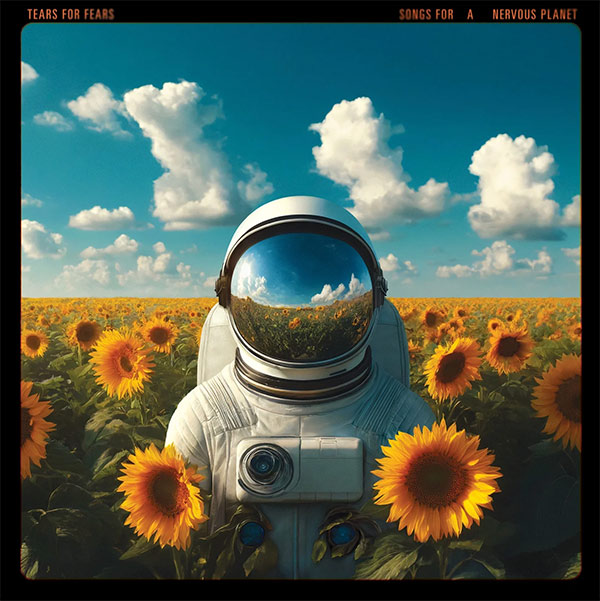
Songs For A Nervous Planet Tears For Fears /
-
-
Steven Wilson Dolby Atmos Mix, Steven Wilson DTS-HD Master Audio 5.1 mix (96/24), Steven Wilson Stereo Mix (96/24), Original Stereo Mix
- Say Goodbye To Mum And Dad *
- The Girl That I Call Home *
- Emily Said *
- Astronaut *
- No Small Thing
- Tipping Point
- Everybody Wants To Rule The World
- Secret World
- Sowing The Seeds Of Love
- Long, Long, Long Time
- Break The Man
- My Demons
- Rivers of Mercy
- Mad World
- Suffer The Children
- Woman In Chains
- Badman’s Song
- Pale Shelter
- Break It Down Again
- Head Over Heels
- Change
- Shout
*New Studio Tracks
Bonus tracks
- Say Goodbye To Mum And Dad – Steven Wilson Instrumental Mix
- The Girl That I Call Home- Steven Wilson Instrumental Mix
- Emily Said – Steven Wilson Instrumental Mix
- Astronaut- Steven Wilson Instrumental Mix
-

 Interview
Interview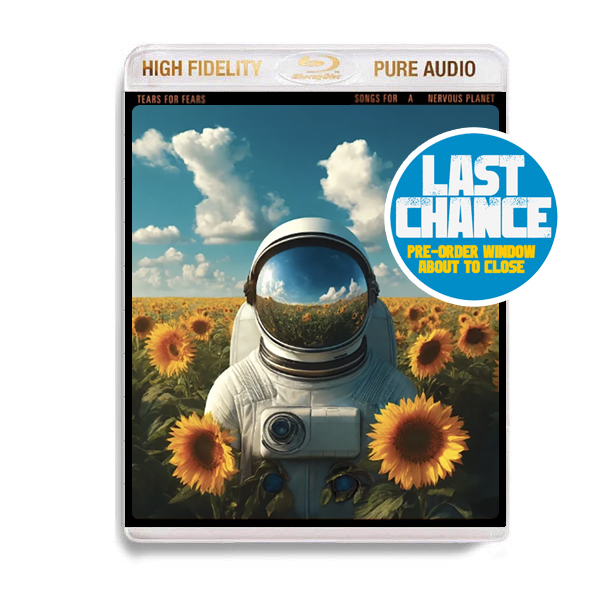
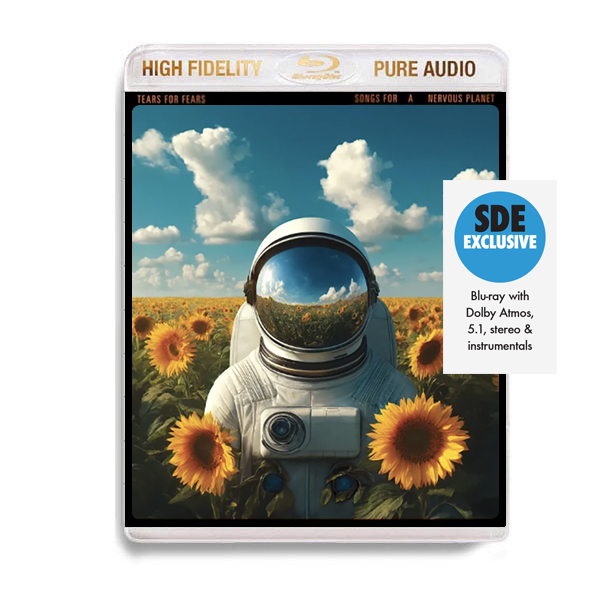
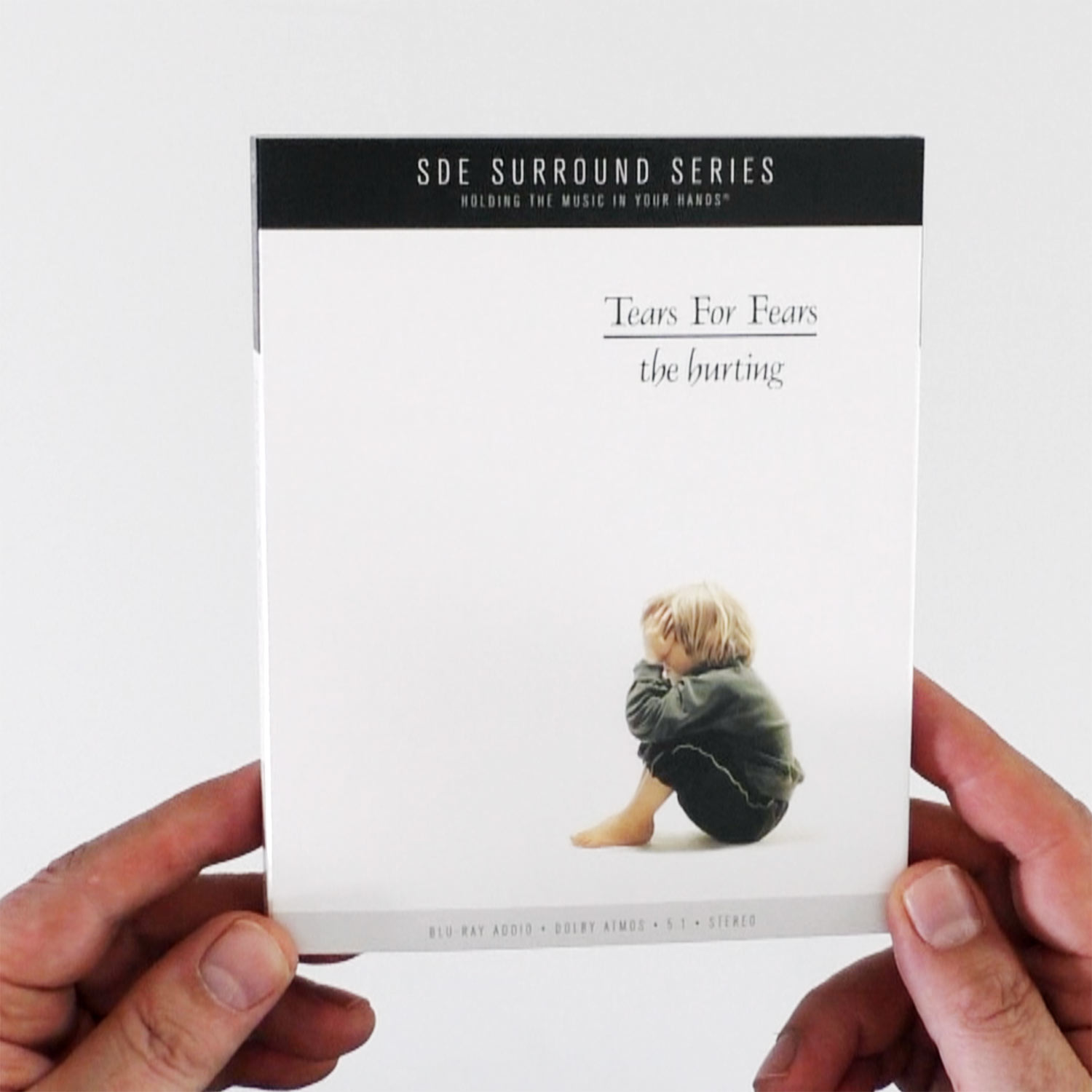
 SDEtv
SDEtv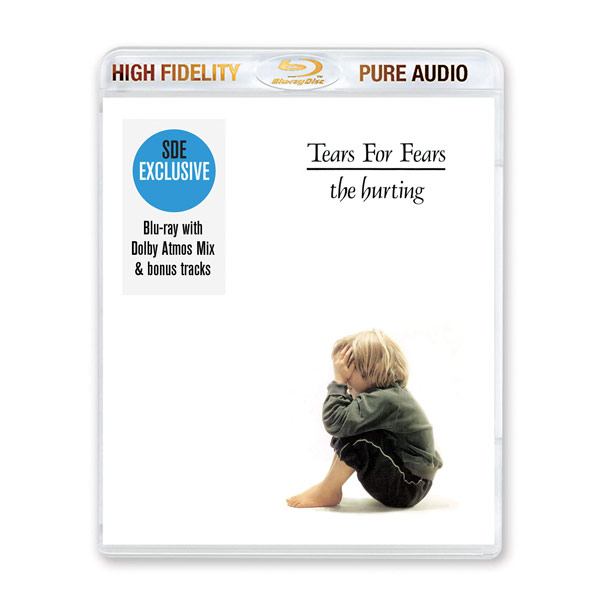
By Paul Sinclair
68